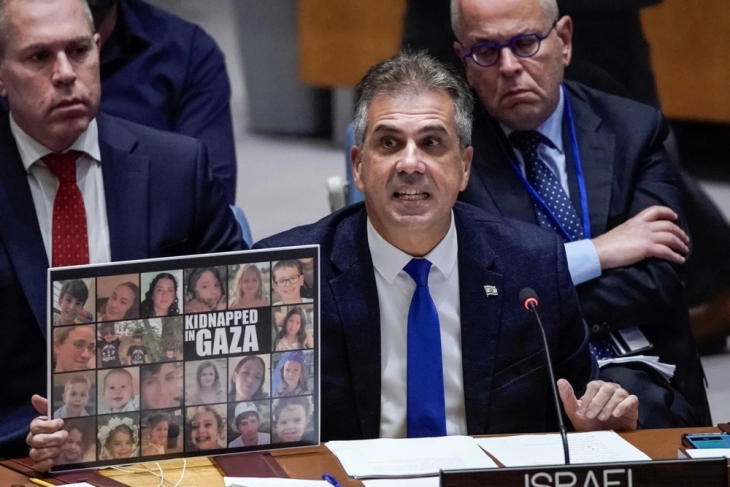UN's Guterres invokes Article 99 over 'urgent' Gaza situation
- In a rare move, United Nations Secretary-General António Guterres has urged the UN Security Council to take action to avert a humanitarian catastrophe in the Gaza Strip.

New York, 7 December 2023 (dpa/MIA) - In a rare move, United Nations Secretary-General António Guterres has urged the UN Security Council to take action to avert a humanitarian catastrophe in the Gaza Strip.
In a letter to the Security Council on Wednesday, the UN chief invoked Article 99 of the UN Charter for the first time since taking office in 2017.
The massive loss of life in the Gaza Strip and in Israel within a comparatively short period of time spurred Guterres's decision to invoke Article 99, according to the UN.
This allows the Secretary-General to draw the attention of the Security Council to "any matter which, in his opinion, may jeopardize the maintenance of international peace and security." According to the UN, Article 99 has not been invoked for decades.
"Facing a severe risk of collapse of the humanitarian system in Gaza, I urge the Council to help avert a humanitarian catastrophe & appeal for a humanitarian ceasefire to be declared," Guterres said on the social media platform X, formerly known as Twitter.
He attached his letter to his post.
"I urge the members of the Security Council to press to avert a humanitarian catastrophe. I reiterate my appeal for a humanitarian ceasefire to be declared. This is urgent," the letter said.
"The civilian population must be spared from greater harm."
He outlined the dire situation for civilians in the narrow coastal strip of land, warning of total breakdown of civil society and the spread of disease due to overcrowding in inhumane living conditions.
Almost 1.9 million, more than three-quarters of the Gaza Strip's population, have been forced to leave their homes and corralled into an ever-decreasing space in the southern Gaza Strip, where they have neither access to drinking water, nor enough to eat.
"Without shelter or the essentials to survive, I expect public order to completely break down soon due to the desperate conditions, rendering even limited humanitarian assistance impossible," Guterres wrote.
"The situation is fast deteriorating into a catastrophe with potentially irreversible implications for Palestinians as a whole and for peace and security in the region. Such an outcome must be avoided at all cost."
Israel's Foreign Minister Eli Cohen sharply criticized Guterres' move.
"Guterres' tenure is a danger to world peace," Cohen said on the social media platform X, formerly known as Twitter.
"His request to activate Article 99 and the call for a cease fire in Gaza constitutes support of the Hamas terrorist organization and an endorsement of the murder of the elderly, the abduction of babies and the rape of women," Cohen continued.
"Anyone who supports world peace must support the liberation of Gaza from Hamas."
The relationship between Israel and the UN is strained. The UN bodies reflect the attitude of the countries of the world, the majority of which are highly critical of Israel's military actions in the Gaza Strip which have killed many thousands of civilians.
There are no direct consequences of invoking Article 99. However, it is to be expected that the Security Council will meet this week to discuss the issue and that UN chief Guterres will also be present.
Normally, the members of the Security Council themselves decide which matters they perceive as a threat to world peace and therefore wish to put on the agenda. So far, the most powerful UN body has passed a resolution on the Gaza war, but has otherwise often been divided.
Israel's massive military retaliation was triggered by the worst terrorist attack in Israel's history, by militants from Hamas and other terrorist groups on October 7 in southern Israel. Israel says more than 1,200 people, including around 850 civilians, were killed.
According to the Hamas-controlled Ministry of Health, the Israeli army has killed more than 16,200 people in the Gaza Strip since then.
This figure cannot be independently verified at present. However, the UN and observers point out that the authority's figures have proved to be generally credible in the past.
Late on Wednesday evening, Israel announced it had authorized more fuel to be let into the south of the Gaza Strip. The Security Cabinet approved a corresponding recommendation from the War Cabinet on Wednesday evening, according to Prime Minister Benjamin Netanyahu's office.
An increase in the authorised minimum quantity was necessary "to prevent a humanitarian collapse and the outbreak of epidemics," it added. It was not made clear how much fuel would be allowed into the Gaza Strip or when.
The US had previously demanded that Israel allow more aid supplies into the Gaza Strip. According to Israeli media reports, Washington wants the daily delivery of 60,000 litres of fuel to be doubled or even tripled.
Photo: MIA archive







